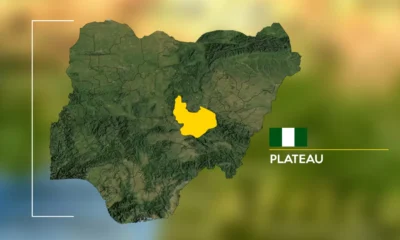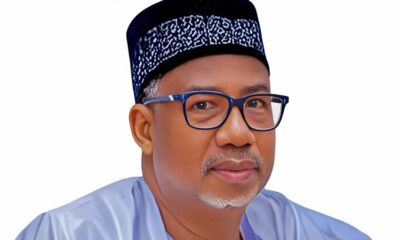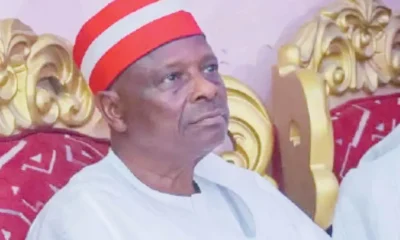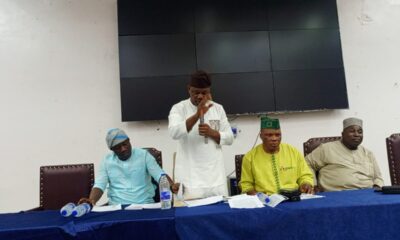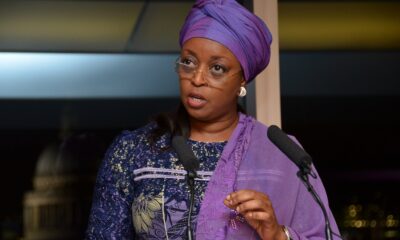Opinion
Can Tinubu lay the Chibok ghost to rest?

The past week was a nightmare that saw nearly 300 people kidnapped, mostly from schools.
In Kebbi, at least 24 were snatched from Government Girls’ Comprehensive Secondary School, Maga, before dawn on Monday.
On Tuesday in Kwara, gunmen killed two people and abducted 38 worshippers from a church in Eruku, and are demanding N100m per head.
By Friday, more than 215 children and 12 teachers were seized after gunmen stormed St. Mary’s Catholic School in Papiri, Agwara LGA of Niger State.
For President Bola Tinubu, who is still managing the political fallout from Donald Trump’s threats to “move in, guns a-blazing” and cut aid if Nigeria does not act swiftly, this is a test of will; a test his predecessor, Goodluck Jonathan, sat for in 2014 and later paid for with his second-term ambition.
Yet Tinubu’s test is unique. His question paper contains a direct threat from a world power.
On October 30, US President Donald Trump labelled Nigeria a “Country of Particular Concern.” Given the circumstances, some might say “Country of Multiple Concerns.”
Either way, such a warning from the White House shoved our local security crisis onto the global stage. This, in my opinion, is as much an advantage as it is an embarrassment.
The last time Nigeria drew this much attention was in April 2014, when Boko Haram kidnapped over 200 schoolgirls in Chibok, Borno State. Sadly, many more abductions have followed.
As expected, the newfound spotlight led to a free-for-all. Even people who can’t identify Nigeria on a map suddenly had hot takes.
Given America’s interventionist history, Nigerians have legitimate fears, too. There’s some substance in what Presidential spokesman Bayo Onanuga called “orchestrated moves” against Nigeria’s image.
But let’s be honest: our detractors are only using a knife we left lying around for years.
However, Trump’s threats didn’t land on Tinubu’s ears alone. The terrorists heard it too. And they hear differently. I’ll explain. Step closer, please.
It was 5 February 2003, and US Secretary of State Colin Powell was addressing the UN Security Council. Just a little over a year after the 9/11 attacks, Powell was introducing a new name before the council, Abu Musab al-Zarqawi, a name he mentioned 21 times in one speech.
The goal was to establish an operational link between Al-Qaeda and Saddam Hussein’s government in Iraq to justify military action.
However, the side effect turned a fringe, hit-and-run local champion into a global terror brand.
The high-profile public mention signalled that al-Zarqawi, a relatively obscure figure, was finally getting global recognition for his (evil) works.
It was like being nominated for the Golden Globe Award, but for terrorists. Think of a scrappy local artist suddenly landing on Obama’s favourite songs of the year list. Yes.
So, al-Zarqawi’s newfound notoriety attracted significant cash, support, and followers from the global extremist ecosystem, the kind even Osama bin Laden would have envied.
By pressuring the government to sit up, Trump may have inadvertently pinned an al-Zarqawi medal on these bandits. To them, his threats meant, “I see you. I notice you.”
Could this explain the surge in kidnappings that forced some states to temporarily shut down schools? A wise yet desperate and defensive crouch.
In all this, it is hard not to think of the Jonathan presidency, when terrorists counted their wins like casino kings. It’s déjà vu. We are up to our eyeballs in issues of school kidnappings that still feel like those days.
Now, don’t get this confused. The Buhari years also had their fair share of kidnappings. The Kankara boys incident still feels like yesterday.
Jonathan’s case was different due to a convergence of several factors which aren’t the focus of this column. What was clear was that the government looked dismally powerless.
Some Nigerians even flirted with the idea of foreign boots on our soil. Even today, some believe Trump’s threats are the hand of God intervening where leaders have failed.
International scrutiny can be a useful scourge; it forces any forward-thinking government to self-evaluate. But it cannot be our strategy. A sovereign nation should not need to be shoved into its basic responsibilities.
As a citizen, Tinubu exercised his right to criticise Jonathan’s handling of the Chibok abductions at the time. Today, 11 short years later, he sits in the same examination hall. At the same desk. Under the same cloud of witnesses.
How will he handle this crisis?
As a start, he chose to be present. He postponed and eventually cancelled his engagements at the G20 in South Africa, slated for this weekend. Vice President Kashim Shettima is now leading the Nigerian delegation there. A fair start, because in early July 2022, his immediate predecessor left for a Senegal summit just hours after an attack on Kuje prison freed hundreds of terrorists.
Tinubu also sent Shettima to Kebbi on Wednesday to meet the parents of the kidnapped schoolgirls and ordered a heavy manhunt for the Kebbi and Kwara kidnappers and their captives.
The Presidency said Tinubu, briefed by service chiefs, was “saddened” by the Kebbi abduction. It stung even more because there had been intelligence warnings of a possible strike.
He then ordered the Minister of State for Defence, Bello Matawalle, to relocate to Kebbi to coordinate rescue efforts. It’s not hard to see why. In February 2021, while Matawalle was Zamfara State Governor, 279 pupils from Jangebe were abducted and freed days later after back-channel negotiations.
These are some of the moves Nigerians can see. There are others we should hope for but won’t hear about until they work. But the questions remain: Will the Tinubu administration feed the ransom market to free the abducted or take a Margaret Thatcher stance?
Will it, like those before it, outsource grief to “high-powered delegations,” only to return to business as usual?
There is a reason the Chibok episode still haunts. It is the ghastly reminder that 11 years later, children are risking their very lives for an education in Nigeria. It is the grim reality that a child can leave home for school, not a battlefield, and likely return dead or worse, traumatised for life.
If Tinubu wants to lay the ghost of Chibok to rest, he must enforce a different script. One that doesn’t give terrorists a slap on the wrist. One that makes justice real and visible, and makes impunity expensive.
For now, the bandits are revelling in their wins. That celebration should not be long. (Punch)
-

 Metro22 hours ago
Metro22 hours agoWoman In Oshiomhole’s Luxury Jet Video Identified As South African Explicit Content Creator Who Calls Herself ‘Professional Sugar Baby’ – Report
-

 News19 hours ago
News19 hours agoFive Residents, Soldier Killed As Bandits Attack Plateau Communities
-

 Metro18 hours ago
Metro18 hours agoBauchi govt approves monthly stipend for imams, pastors
-

 News21 hours ago
News21 hours ago“Former Textile Worker Now Living Like Pablo Escobar” – Lawyer Adeyanju Slams Senator Oshiomhole Over Video With Young Woman
-

 News19 hours ago
News19 hours agoKwankwaso Not Involved In Negotiation With APC, Says Kwankwasiyya Movement
-

 News21 hours ago
News21 hours agoRecord Shows Nigerian Sports Commission Spent N877million To Fence Abuja’s Moshood Abiola Stadium
-

 News16 hours ago
News16 hours agoLagos Assembly orders immediate halt to Makoko demolitions amid protests against govt’s actions
-

 News21 hours ago
News21 hours agoDiezani spent £140,000 on luxury furniture in a single day – British prosecutors tell court





